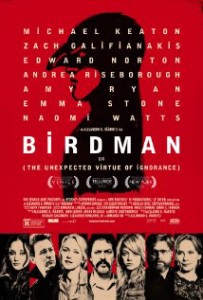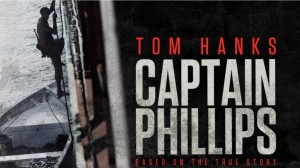Winner of the Oscar for Best Picture Lives Up to the Hype
 The newest inductee to the lucrative Best Picture club is Alejandro G. Iñárritu’s Birdman: Or (The Unexpected Virtue of Ignorance). With such a high honor being bestowed on a film there is often ample skepticism as to its actual quality. Is Birdman truly better than American Sniper or Boyhood? The plot summary is this: Riggan Thomson, played by Michael Keaton, is a former blockbuster star, made famous and beloved for his roles as Birdman, a superhero in the 80s and 90s. Having fallen from stardom and faded into relative obscurity in the public eye, Riggan attempts to jumpstart his stagnant career with a self-directed, self-written, and self-acted Broadway production in hopes to once again find relevance in the entertainment industry.
The newest inductee to the lucrative Best Picture club is Alejandro G. Iñárritu’s Birdman: Or (The Unexpected Virtue of Ignorance). With such a high honor being bestowed on a film there is often ample skepticism as to its actual quality. Is Birdman truly better than American Sniper or Boyhood? The plot summary is this: Riggan Thomson, played by Michael Keaton, is a former blockbuster star, made famous and beloved for his roles as Birdman, a superhero in the 80s and 90s. Having fallen from stardom and faded into relative obscurity in the public eye, Riggan attempts to jumpstart his stagnant career with a self-directed, self-written, and self-acted Broadway production in hopes to once again find relevance in the entertainment industry.
While the story may seem simplistic at face value, what makes Birdman truly great is its execution. This is one of the most artistically invigorating and emotionally stimulating films that I have ever seen. Every convention of good filmmaking is present here and done to the highest level of quality.
The casting of Michael Keaton as Riggan is no coincidence. Many probably remember his role as the brooding caped crusader himself in Tim Burton’s Batman in 1989, Keaton reprising the role in 1992 in Batman Returns. Given his history in the industry, Keaton’s casting in Birdman makes his struggle a deeply personal one as an actor fighting to stay relevant and be taken seriously.
Riggan’s character is effortlessly relatable. He is nervous, unsure of himself, erratic, and emotionally unstable, making him an easy target to be written as the token underdog character. Thankfully, the movie transcends that trope by refusing to make him spotlessly perfect, Riggan is human after all. He is divorced, has an estranged teenage daughter, has issues maintaining relationships, and can at times be a little bit of a jerk. As a character who receives the viewer’s sympathy, reprehension, and respect all in one movie, Keaton absolutely shines playing Riggan, making his Oscar nomination for the Best Actor especially justified.
While Keaton is the one most in need of an encore, by no means is the rest of the cast undeserving. Most notably are Emma Stone as his cynical, sarcastic, just-out-of-drug-rehab daughter, Edward Norton as a last minute cast-replacement playing a hysterical parody of himself as a brilliant actor who is difficult to work with on and off the stage, and Zach Galifianakis, of all people, who takes a surprisingly nuanced turn as Riggan’s best friend and production manager.
Birdman’s tone fluctuates between reality and the surreal, garnered by Riggan’s unique perspective of the world around him and grounded by his more “level-headed” cast members. Whether the camera traverses the stage during rehearsals, follows Riggan through his daydreams or certain cast members through the tight corridors of the theatre and down the streets and alleys of New York, the shot composition is hypnotizing. The camera is always rolling, never cutting, making Birdman resemble one enormous tracking shot that would make even Wes Anderson blush. The more ethereal scenes are accompanied by full orchestras playing muted symphonies, lulling the viewer into its dreamlike atmosphere and for the majority of the film, Birdman marches along anxiously and excitedly to the pulsating beat of drums, pounding in cacophonous syncopated rhythms, able to carve out the tension of the scene unaccompanied.
Seeing Murphy’s Law take effect as more and more things continue to go wrong for Riggan takes its toll as it becomes apparent that this play is his everything. Through all of the melancholy, the personal drama, the selfish desire to sell out and be thrown right back into the blockbuster formula, Riggan’s stress is shared with the viewer. If the play bombs, the rest of the cast might emerge embarrassed but relatively unscathed, but for Riggan this is his last chance. “We should have done that reality show they offered us,” says the voice in his head, forcing him to turn back, but there is no going back. For Riggan, this is all or not


